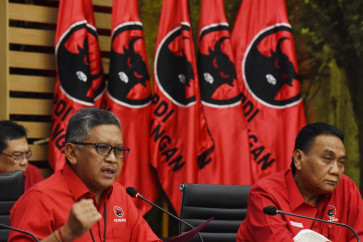Dialogue with vendors 'key' to relocation
Chaos prevails: Jl
Change Size

C
span class="inline inline-center">Chaos prevails: Jl. Jembatan Tinggi in Tanah Abang shopping complex, Central Jakarta, is full of street vendors and ojek (motorcycle taxi) drivers. Since last year, the city administration has evicted and relocated street vendors in various places in Jakarta. JP/Ricky Yudhistira
Jakarta Governor Joko 'Jokowi' Widodo has failed to adequately include street vendors in the administration's planned relocation process of vendors to allocated markets, such as the Blok G building in the Tanah Abang market in Central Jakarta, according to an association executive.
'We are supposed to be working together with the city administration but we have not been included in the [relocation] process,' chairwoman of the Jakarta branch of the Indonesian Street Vendor Association (APKLI) Hoiza Siregar told The Jakarta Post.
She said that if the administration did not take into account the vendors' opinions, the program would eventually fail.
'If we cannot provide input, we'd better act independently,' she said.
In his time as mayor of Surakarta, Central Java, Jokowi was commended for successfully relocating around 1,000 street vendors from Banjarsari Park to Notoharjo Klithikan.
During the process he hosted 54 luncheons and dinner meetings at his official residence to hear vendors' views and explain his plans.
Hoiza said that the Jakarta administration had to consider that vendors required locations that were accessible to customers. 'Tourist attractions, such as the National Monument [Monas], for example, are ideal locations for street vendors,' she said. 'In developed countries such sites are filled with street vendors.'
She said that rental fees would not be an issue as long as there was a healthy flow of customers in the locations provided. 'It doesn't matter if the monthly rent is Rp 300,000 (US$25.84) or Rp 3 million, as long as we're making profit,' she said.
She said that for certain cases, the administration should prepare and train the vendors, to help facilitate the process.
Jokowi said recently that he would not provide training to the street vendors relocated to Blok G. 'I can't provide entrepreneurship training for them because they have to develop their business instinct themselves,' said Jokowi, who used to be an entrepreneur himself.
A sociologist from Airlangga University, Karnaji, said despite the fact that Jakarta's street vendors were mostly from out of town, they could potentially become the city's economic backbone.
'The administration can't just evict them, because they contribute to the city's economy by supplying goods to the middle-low income bracket,' he told the Post.
Customers in the middle-low income bracket generally bought their goods on the street. Thus, the city administration should take into consideration relocating them to new places, he said.
A researcher for the Consortium for Public Institution Monitoring and Empowerment (Kompip), Akbarudin Arif, also suggested that street vendors should be involved in the administration's relocation plans, through official meetings.
'There needs to be communication between the two parties first before the [relocation] process,'
Akbar said.
Kompip, along with the Solidarity for Marginalized Communities of Surakarta (Sompis), was involved in the relocation of the 1,000 street vendors in Surakarta. The two groups represented 800 of the 1,000 street vendors.
Akbar said that Jokowi succeeded in relocating the Banjarsari vendors because he held meetings with them prior to the relocation.
In the discussions, the vendors demanded that, among other things, the administration create public transportation routes along the Notoharjo market as well change the layout of the market's parking lot, he said.
Jokowi's positive response to the demands indicated the Surakarta administration acknowledged the rights of the informal sector, he added.
'Unfortunately, Jokowi, as Jakarta governor, has not adopted the same approach that he previously used successfully,' Akbar said.
He suggested that those in the informal sector should be respected because they were the backbone of the national economy.
The relocation process, therefore, should be conducted carefully and the city administration had to keep in mind that the vendors had to provide for their families, he said, adding that their daily incomes were usually only enough to pay for a single day's expenses.
Akbar said that the street vendor issue was actually a national problem that should be handled carefully by the government, as there are currently no laws and infrastructure in place to protect the informal sector. (ask)









